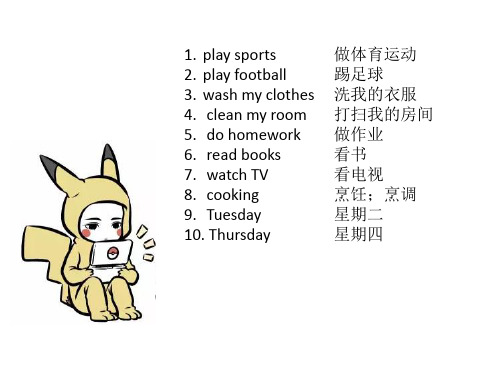实义动词一般现在时的7个话题
实义动词一般现在时

06
练习与巩固
选择题
• 选择题1:He ___a book every day.
选择题
reads is reading
has read
选择题
reads
选择题2:She _______ English in this school since 2018.
选择题
teaches
has taught
它通常用于描述习惯、事实、真 理或当前情境。
学习目标
掌握实义动词一般现 在时的基本用法。
能够在实际语境中正 确运用实义动词一般 现在时。
理解该时态的构成和 变化规则。
02
实义动词一般现在时的定义
定义
实义动词一般现在时是英语语法中的 一种时态,表示现在时间发生的动作 或存在的状态。
它通常用于描述习惯性、经常性或当 前发生的动作或状态,以及客观事实 和普遍真理。
详细描述
在英语中,实义动词的一般现在时可以用来描述一种习惯或经常发生的动作。例如,“I eat breakfast every morning”表示“我每天早上都吃早餐”。这种时态常用于描述日常习惯、规律性 活动或频繁发生的动作。
表示目前的状态或特征
总结词
描述当前存在的状态或特征。
详细描述
实义动词的一般现在时也可以用来描述目前的状态或特征。例如,“She is a student”表示“她是一名学生”。这种用法常用于描述身份、职位、性格特点 等当前状态或特征。
特点
与其他时态相比,一般现在时的动词形式较 为简单,只有第三人称单数主语需要加-s/es。
一般现在时可以与频度副词(如always, usually, often等)连用,表示动作发生的频 率。
实义动词的一般现在时

• 当主语为第三人称单数时,用助动词does
构成否定。其余用Po助w动er词Badro构成否定
中国专业PPT设计交流论坛
Model 1: I like fish. I don’t like fish.
Powerd. I don’t like red.
The moon goes around the earth.
一般现在时的构成
一、系动词中P国ob专w业ePPe的T设r计一交B流a论般r坛 现在时
二、实义动词的一般现在时
实义动词的一般现在时
• 肯定句的构成
主语 + 实义动词 + 其他
These boys Pliokweer Baprlaying football.
6. She has a dog at home. She doesn’t have a dog at home.
11
p1la. yJsohn _______(play) basketball.
doesnH’et p__la_y_____P__o_w(neort Bpalary) football.
2. They like apples. They don’t like apples. 3. We take a bus to school every day.
We don’t take a bus to school every day.
10
Model 2. He likes reading. He doesn’t like reading.
These boys don’t(do not) like playing football.
These boys like pla中Py国oi专nw业gPPefT设or计o交Bt流ba论ar坛ll.
一般现在时实意动词

Her friends go shopping. Mary goes shopping.
Jane reads books. The students read books.
二. 哪些主语 是第三人称单
数
1.人称代词he, she, it是第三人称 单数.
1).He likes watching TV. 他喜欢看电视.
2).Beijing is in China. 北京在中 国.
3). Miss Wu often makes cakes.王叔叔经常做蛋糕.
3.单数可数名词或 “this/that/the + 单数可数名词”
作主语时,是第三人称单数. 如: 1).This girl plays football in school.
• 13. My father always __________(come) back(回来) from work very late.
• 14. The teacher is busy. He __________ (sleep睡觉) six hours a day.
• 15. Joan __________(sing唱歌) in the classroom every day. She often __________ (sing) there.
2).She has lunch at twelve. 他十二点吃午餐.
3). It looks like a cat. 它看起来象只猫.
2. 单个人名.地名或称呼作主语时, 是第三人称单数形式.如:
1).Han Mei watches TV with her mother.韩梅和她的母亲看电 视.
2.2.We like MaW the. don’ t like Moths.
关于实义动词一般现在时课件

They watch TV. (变一般疑问句)
Do they watch TV?
Yes, they do. No, they don’t.
Betty’s brothers finish school at 5pm Yes, they do.
用括号中所给词的适当形式填空; 1.I often _____go(go) swimming on Sunday. 2.My daughter ____w_a_t_c_h_es(watch) TV every
day. Sometimes she ___s_e_e_s_ (see) a film on Sunday. 3.Li Wei _____h_a_s_ (have) a daughter. 4.Her mother ____t_e_a_c_h_es__ (teach) English
at a middle school. 5.Jack often __l_is_te_n_s__(listen) to the radio. 6.He ____s_a_y_s_ (say) that Li Lei is tired.
写出下列动词适当形式:
1)We ____l_o_v_e____ (love) sports. 2)She _____s_i_n_g_s__ (sing) well. 3)Tom and John ____w_a_t(cwhatch) TV every evening. 4)My son ___g__o_e_s____ (go) to school by bike. 5)Their teacher usually ________ (wwaalklk) tso school. 6)Five plus two ________m__a_ke(msake) seven. 7)They all _______l_ik__e_ (like) him. 8)The sun _____f_a_l_ls___ (fall) in the west.
实义动词的一般现在时

4.My father______ well in the evening every day. A.doesn’t feel B.don’t feel C.doesn’t feels 5.Do they have a new car?Yes,______. A.they are. B.they don’t C.they do 6.Does he _____TV? A.watches B.watch C.watching
七 、改为一般疑问句并作肯定、否定回答
1.I am a doctor.
2. Ben is from America. 3. I often go to school at six o’clock.
4.He wants a book.
5.Lisa likes milk very much. 6.I like play football.
实义动词的句型结构
肯定句:主语+动词+其他. 否定句: 主语+don't/doesn't+动词原形+其 他. 一般疑问句:Do/Does+主语+动词原形+其他? 肯定回答:主语+do/does. 否定回答:主语+don't/doesn't. 特殊疑问句:特殊疑问词+do/does+主语+ 动词原形+其他?
When does she go shopping ?
一、写出下列动词第三人称单数形式
buy answer clean give work read want
help ask sit cook make speak watch
have sing play cut do teach tell
实义动词的一般现在时(新)

人教版英语七年级上册5单元
变动词三单人称口诀
一般情况动词尾-s加。 o, s, ch, sh 结尾“-es”没有差。
辅音加y ,去y为i,再加“-es”是方法。
1. My father_______(listen) to the radio every day. listens studies (study) in a middle school. 2. Mike_______
But they don’t __________(not play) ball games. play
4. You _______(like) fish. like
But he ___________(not like) fish. doesn’t like
12
一般疑问句
含行为动词的句子如何转换成一般疑问句
I like fish. I don’t like fish.
1. I like red. I don’t like red. 2. They like apples.
They don’t like apples. 3. We take a bus to school every day. We don’t take a bus to school every day.
XX版本XX学科XX年级X册X单元X课
一般现在时 simple present tense
表示现在的状态
表示经常的或习惯性的动作
表示主语具备的性格和能力
一般现在时 simple present tense
人教版英语七年级上册5单元
一般现在时 simple present tense
人教版英语七年级上册5单元
人教版英语七年级上册5单元
一般现在时-实意动词 练习

Lesson8一般现在时(含实义动词)every day◆一、填空。
1.第三人称单数主语,简称“”。
口诀:2.一般现在时肯定句中,遇到三单主语,后面的动词3.助动词do/does/don’t/doesn’t+实义动词的4.动词三单形式的变化规则并举例:含实义动词,主语是三单形式的句型转换:1.肯定句结构:例句:2.否定句结构:例句:3.一般疑问句结构:例句:口诀:1.肯变否:2.肯变疑:3.回答:二、写出下列动词的第三人称单数。
drink________go_______fly________run________ make________pass_______carry________brush________ come________study_______watch______catch________ do_________teach_______sit________stay________ have_______plant_______play________pick________ cry_______take_______tie_______like_______ ride_______paint_______speak_______live_______三、圈出正确的答案。
1.She(like/likes)to play football.2.He(like/likes)drinking milk.3.I(like/likes)to watch TV.4.We(like/likes)to play badminton.5.They(like/likes)to sing songs.6.She(read/reads)books every day.7.He(play/plays)computer games every day.8.It(listen/listens)to the radio every day.9.Linda(draw/draws)pictures every day.10.Jane and Linda(play/plays)football every day.四、肯定句填空。
一般现在时之实义动词

play football
What do you often do on the weekend?
wash my clothes
What do you often do on the weekend?
clean my room
是第三人称单数。
单数可数名词或"this / that / the+单数可数 名词"作主语时,是第 三人称单数。
标志词
频率副词
always
often
usually sometimes
Become increasingly infrequent
rarely
seldom
never
标志词
every
day month year week morning afternoon evening
那我还要变一般疑问句呢?
看我魔法啦!
实义动词
助动词
Nina has short hair and two big eyes.
Does Nina have short hair and two big eyes?
试着说下步骤?
1.先找动词,如果动词是be动词或者 情态动词直接提前并大写
2.如果动词是实义动词,就看人称是不 是三单
否定句: My mother doesn't go to school by bus. 一般疑问句:Does your mother go to school by bus? 肯定回答: Yes, she does. 否定回答: No, she doesn’t.
They go on a picnic on the weekend.
- 1、下载文档前请自行甄别文档内容的完整性,平台不提供额外的编辑、内容补充、找答案等附加服务。
- 2、"仅部分预览"的文档,不可在线预览部分如存在完整性等问题,可反馈申请退款(可完整预览的文档不适用该条件!)。
- 3、如文档侵犯您的权益,请联系客服反馈,我们会尽快为您处理(人工客服工作时间:9:00-18:30)。
一、谈论日常活动读下面的句子,理解what time与when的区别。
What time is it?It’s ten twenty.What time is your English class?My English class is from ten ten to eleven forty.When is her birthday? Her birthday is February 4th. When is your school trip? My school trip is on Saturday. When is your meet? It’s at 9 o’clock.归纳:What time只能询问______的时刻,如:几点几分,when既可询问_____的时刻,也可询问______的时间如:on weekends, on Monday, every day等。
What time do /does + 主语+ 实义动词原形+其他?“某人几点做某事?”When do/ does + 主语+ 实义动词原形+其他?“某人什么时候做某事?”What time do you usually get up? I usually get up at six thirty. What time do they usually brush their teeth?They always brush their teeth at six forty.What time does Mike eat breakfast?He eats breakfast at seven o’clock.When does he go to work?He always goes to work at eight o’clock.When do your parents exercise?They usually exercise on weekends.汉译英下面有关日常活动的动词或短语并熟记1.get up2.brush one’s teeth3. eat breakfast4.eat quickly5.have lunch6.have dinner7.go to school 8.do one’s homework9. play sports 10. exercise 11. run 12. take a walk 13. play basketball / volleyball 14.have lessons 15.have four classes 16.go home 17.watch TV 18.take a shower 19.play computer games20.do one’s homework 21. go to bed22. eat vegetables / ice-cream 23. clean the room阅读下面短文,回答问题:Hi! I’m Tom. I don’t like to get up early. In the morning, I getup at eight. Then I go to school at eight thirty. I don’t have much time for breakfast, so I usually eat very quickly. For lunch, I usually eat hamburgers. After school, I sometimes play basketball for half an hour. When I get home, I always do my homework first. In the evening, I either watch TV or play computer games. At ten thirty, I brush my teeth and then I go to bed.Mary is my sister. She usually gets up at six thirty. Then she always takes a shower and eats a good breakfast. After that, she goes to school at eight thirty. At twelve, she eats lots of fruit and vegetables for lunch, she sometimes plays volleyball. She always eats ice-cream after dinner. She knows it's not good for her, but it tastes good! In the evening, she does her homework and usually swims or takes a walk. At nine thirty, she goes to bed.1.Who has a healthy habit? Who is healthier?2.What time does Tony get up?3.What does Tony have for lunch?4.What does Tony sometimes do after school?5.What does tony do in the evening?6.What time does Mary get up?7.What time does she go to school?8.What does she eat for lunch?9.What does she eat after dinner?10.What does she do in the evening?二、谈论怎样去某地1.How do / does +主语+get to +某地?某人这样去某地?主语+get (s)to--- by bike/by car/ by bus/by train / by plane.go(es) to主语take / takes the bus / train/ subway / car to +某地。
某人乘坐------到某地主语+drive(s) one’s car to---.某人开小车到某地。
主语+ ride(s) one’s / a bike to---. 某人骑自行车到------。
主语+walk(s) to ---. 某人步行到------。
2.How long does it take (sb.)to get to +某地?到某地要花某人多长时间?It takes (sb.)---minute(s) / hour(s). 要花某人-----分钟或小时。
3. How far is it from …to …? 从……到------有多远?It’s only about ---meter(s)/ kilometer(s). 只有-------米/公里。
注意:get to+地点名词“到达某地”,如:get to the supermarket; get +副词,get here到这儿get there到那儿get home 到家。
go to+地点名词“去某地”; go+副词, go there去那儿gohome回家。
come to+地点名词“来某地”; come+副词, come here去那儿, come home回家来。
get +副词,get here到这儿get there到那儿get home 到家。
arrive in +大地方,arrive at+小地方,arrive+副词(here,there,home)arrive ____ Chifeng arrive ____ China arrive ____ the cinemawalk to+地点名“走到某地”,如:walk to the bank; walk +副词,walk here走到这儿walk there走到那儿walk home 走回家。
come back home回家来,go back home回家去walk backhome 走回家home 既可以作名词,如:at home 、from my home,也可以作副词。
熟读下面的4段对话,理解句式的用法:1.Boy:How do Bob and Mary get to school?Girl: Bob takes the train and Mary takes the subway.Boy: How does John get to school?Girl: He takes the bus.Boy: How do Paul and Yang Lan get to school?Girl: They walk. Look, there they are now.Boy: Does Jim walk to school?Girl: No, he doesn’t. He rides his bike.2.Lisa: Hey, Jane. Is this your new bike?Jane: Yes, I ride it to school every day. How do you get to school?Lisa: I usually take the bus.Jane: How far is it from your home to school?Lisa: I’m not sure---about 10 kilometers? The bus ride takes about 20 minutes. How long does it take you to get toschool?Jane: About 15 minutes by bike. It’s good exercise.Lisa: Yeah. Well, have a good day at school.Jane: You, too.Mary : How do you get home from school?Tom: I walk.Mary: How long does it take?Tom : It takes about 20 minutes.Mary: Wow! That’s quick. How far is it from the school to your home?Tom: Only about two kilometers.3.Peter: How do you get home from school?Jane: I take the bus.Peter: How long does it take?Jane: oh, about one hour and 30 minutes.Peter: Wow! That’s a long time.Jane: Yes, I only go home on weekends.Peter: How far is it from your home to school?Jane: It’s about 60 kilometers.Boy: How do Bob and Mary get to school?Girl: Bob takes the train and Mary takes the subway.Boy: How does John get to school?Girl: He takes the bus.Boy: How do Paul and Yang Lan get to school?Girl: They walk. Look, there they are now.Boy: Does Jim walk to school?Girl: No, he doesn’t. He rides his bike.语法聚焦:How do you get to school? I ride my bike.How does she get to school? She usually takes the bus.How long does it take to get to school? It takes about 15 minutes.How far is it from your home to school? It’s only about twokilometers.Does Jane walk to school? No, she doesn’t. She goes by bike.Do they take the bus to school? No, they don’t. They walk.练习:把下面的问题与答语配对:1.How does Mike get to school? a. Yes, they do.2.How long does it take to get to school? b. No, he doesn’t.3.How far is it from here? c. He rides his bike.4.Do your friends go to school by us? d. It’s five kilometers.5.Does your dad drive his car to school to work? e. About 15kilometers.三、谈论居住和工作地Where do / does + 主语+ live ?主语+live / lives in---. Where do / does + 主语+ live ?主语+work/ works in ---. Where do you live? I live in Beijing.Where do they live? They live in shanghai.Where does Tom live? He lives in Chengdu.How far do you live from your school? I live far from my school.Where do your parents work? They work in a hospital. Where does your mother work? She works in a middle school.Where does he work? He works in a bank.作业1、读这封来自你在美国的笔友Tom的电子邮件。
